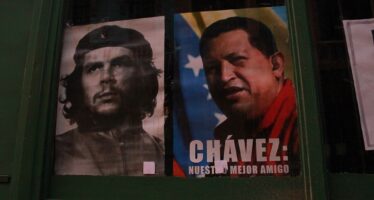Libyan NTC fighters pull back from Sirte
![]()
Fighters regrouping after forces loyal to Muammar Gaddafi mount strong resistance in former leader’s home city
NTC fighters said the had made a ‘tactical retreat’ from Gaddafi’s hometown of Sirte [AFP]
Libya’s interim government forces have retreated from Muammar Gaddafi’s hometown of Sirte, after fighters loyal to the former leader mounted stiff resistance to an attempt to seize the city.
National Transitional Council (NTC) fighters said on Sunday that they were making a “tactical retreat” from the coastal city, a day after entering the centre of Sirte in a major push to take the area.
Explosions rocked the city and plumes of smoke rose into the sky a day earlier, as NTC fighters backed with rockets and heavy artillery launched attacks and Gaddafi’s forces returned fire with mortars and rocket-propelled grenades.
But Al Jazeera’s Zeina Khodr, reporting from the outskirts of Sirte, said NTC fighters were forced to pull back “after a fierce and intense battle. Both sides were using heavy power”.
An NTC commander told our correspondent that the forces retreated because there were not enough to hold territory, and they had endured a high casualty toll among their ranks.
“In fact the casualty toll on Saturday was nine dead among the anti-Gaddafi fighters and up to 97 wounded, mostly as a result of snipers’ fire,” Khodr said.
“We have to remember these are inexperienced fighters.”
Tactical retreat
Khodr added that the NTC commanders are adamant that they were not “forced” to pull back from Sirte’s centre.
“They are calling it a tactical retreat” because they said they achieved their three objectives in Sirte, our correspondent reported.
“One of the objectives was to create a corridor to allow families to actually escape; the second objective was to secure the periphery of Sirte; and the third objective was to block any possible escape route for Gaddafi fighters.”
However, what was achieved from these objectives is quite debatable, Khodr said.
“Not a lot of civilians managed to get out, [besides just] dozens of them. Thousands of people remained trapped inside Sirte… where people lacked food, fuel, running water and electricity.
“It has been awhile since these families [have been] living in unbearable conditions.
“Yet it is very difficult to know if these people actually want to leave because Gaddafi does enjoy support in Sirte.”
Fight for Bani Walid
Besides Sirte, Bani Walid, where medics say at least 30 NTC troops were killed in the past 24 hours, remains the only other major urban area left under Gaddafi’s control.
NTC fighters took the capital, Tripoli, last month, effectively ending Gaddafi’s rule and sending him into hiding.
 Click here for more of Al Jazeera’s special coverage
Click here for more of Al Jazeera’s special coverage
Taking Sirte would be a huge boost for the NTC as it tries to establish credibility as a government, and a devastating blow for Gaddafi, widely believed to be on the run inside Libya.
NATO, whose warplanes played a vital role in the six-month war that toppled Gaddafi, said its planes had hit a number of targets in Sirte, including an ammunition depot and an anti-aircraft gun.
It said in a statement the air attacks had been mounted to protect civilians from Gaddafi forces inside the town.
A Gaddafi spokesman has accused NATO of killing several hundred civilians in strikes on Sirte. Communications have been largely cut off since the fall of Tripoli.
Oasis attacked
Meanwhile, fighting took place in the Ghadames oasis southwest of Tripoli, on Sunday. Witnesses said forces loyal to Gaddafi attacked the oasis at dawn, killing at least five NTC fighters.
“We came under attack at dawn today from Gaddafi loyalists,” Muhandes Sirajeddin, deputy chief of the local council in Ghadames 600km southwest of the capital, told the AFP news agency by telephone.
“Clashes are still under way and so far at least five rebels were killed,” he added.
Two witnesses in Ghadames, a UNESCO World Heritage Site and home to ancient Roman ruins, also confirmed the toll, AFP reported.
Related Articles
Gulf states condemn Syria ‘killing machine’
![]()
Gulf Co-operation Council calls for “serious reforms” and end to bloodshed as fresh violence and arrests are reported Activists estimate
Egypt, Brazil, Turkey: without politics, protest is at the mercy of the elites
![]()
From Egypt to Brazil, street action is driving change, but organisation is essential if it’s not to be hijacked or
Venezuela and China: A friendship forged in struggle
![]()
We were at the embassy of the Bolivarian Republic of Venezuela in China to ring in an important anniversary—209 years to the day since the country declared its independence from Spain




